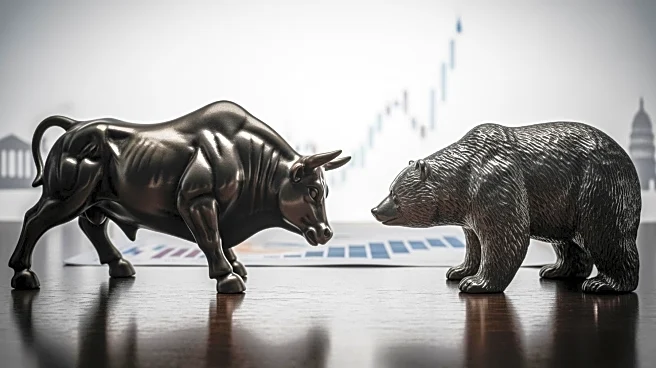What's Happening?
The stock market experienced significant volatility this week, with the Dow Jones Industrial Average reaching an all-time high before retreating. Investors shifted funds from Big Tech to more defensive
sectors like healthcare and financials. The conclusion of the longest-ever U.S. government shutdown and anticipated interest rate cuts were key factors influencing market behavior. Despite the fluctuations, the S&P 500 saw a modest increase of 0.3%, while the Nasdaq fell by nearly 0.5%, marking its second consecutive week of losses. The Dow recorded a weekly gain of 0.3%. Notably, Wells Fargo and Goldman Sachs shares hit record highs, benefiting from investor interest in financials as a safer alternative to high AI valuations. DuPont's stock also reached an all-time high following its split from Qnity Electronics, although it closed slightly lower by week's end.
Why It's Important?
The market's volatility highlights the ongoing uncertainty in the U.S. economy, with investors seeking stability amid fluctuating valuations in tech stocks. The shift towards defensive sectors suggests a cautious approach by investors, potentially impacting the growth trajectory of tech companies. The financial sector's gains indicate a preference for stability, which could influence future investment strategies. Additionally, the government's actions, such as ending the shutdown and potential interest rate cuts, play a crucial role in shaping market expectations and investor confidence. These developments could have long-term implications for economic growth and sector performance.
What's Next?
Investors are likely to continue monitoring government policies and economic indicators for signs of stability. The anticipated interest rate cuts could further influence market dynamics, potentially affecting borrowing costs and investment decisions. Companies in defensive sectors may continue to attract investor interest, while tech stocks could face scrutiny over high valuations. The market's response to these factors will be crucial in determining future trends and investment strategies.
Beyond the Headlines
The volatility in the stock market underscores the broader economic challenges facing the U.S., including balancing growth with stability. The shift in investor focus from tech to defensive sectors may reflect concerns over sustainability and long-term growth prospects. Additionally, the government's role in shaping economic policy and market expectations remains a critical factor in navigating these challenges.










